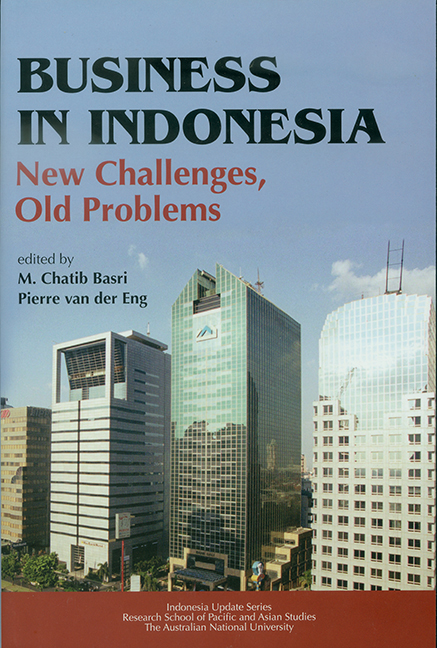Book contents
- Frontmatter
- Contents
- Tables
- Figures
- Contributors
- Acknowledgments
- Glossary
- 1 Business in Indonesia: Old Problems and New Challenges
- PART I Political and Economic Developments
- 2 Political Update 2003: Terrorism, Nationalism and Disillusionment with Reform
- 3 Economic Update 2003: After Five Years of Reformasi Ekonomi, What Next?
- PART II Overview of the Business Environment
- PART III Foreign Investment and Trade
- PART IV Key Issues in the Business Environment
- References
- Index
- Indonesia Update Series
2 - Political Update 2003: Terrorism, Nationalism and Disillusionment with Reform
from PART I - Political and Economic Developments
Published online by Cambridge University Press: 21 October 2015
- Frontmatter
- Contents
- Tables
- Figures
- Contributors
- Acknowledgments
- Glossary
- 1 Business in Indonesia: Old Problems and New Challenges
- PART I Political and Economic Developments
- 2 Political Update 2003: Terrorism, Nationalism and Disillusionment with Reform
- 3 Economic Update 2003: After Five Years of Reformasi Ekonomi, What Next?
- PART II Overview of the Business Environment
- PART III Foreign Investment and Trade
- PART IV Key Issues in the Business Environment
- References
- Index
- Indonesia Update Series
Summary
If the international community, especially Australia and the United States, saw terrorism as dominating developments in Indonesia during the year, most Indonesians did not. For the political elite, there were far more important issues: rising corruption; stalled democratic reform; how to maintain the country's territorial integrity; the battle between the army and police for control of internal security; the impact of political Islam; the consequences of decentralisation; and manoeuvring for the 2004 elections.
For those outside the elite, all politics was local. People were concerned about personal security, but less because of the Bali bombings than because of vigilantism in their neighbourhoods. In Lombok, the question of whether a ban on gambling would lead to increased tensions between ethnic Balinese and Sasaks was far more important than what happened to Amrozi.
And yet there were issues that touched both the elite and non-elite across the country. One was the dismal performance of civilian leaders. As respect for President Megawati Sukarnoputri plummeted, nostalgia for Soeharto-style leadership grew and promised to be a factor in the 2004 elections.
Nationalism, combined with suspicion of foreigners, was on the upsurge, and helped account for the strong public support for military operations in Aceh. The government managed to transform the name of the government from ‘RI’ – Republik Indonesia – to ‘NKRI’ – Unitary State of the Republic of Indonesia’ – and struck a responsive chord by promising to defend the nation from separatists, their foreign supporters and international institutions like the United Nations and the International Court of Justice.
Anti-Western, and particularly anti-American, sentiment was high, fuelled by the war on Iraq. While the Indonesian reaction was muted and street demonstrations few, perceptions of the United States and its allies turned strongly negative across the board. This not only elped to reinforce the notion that the war on terror was a war on Islam, but also meant that, in relation to issues such as Aceh, military accountability for human rights abuses and security sector reform, international donors had even less leverage than they did under normal circumstances.
Finally, Indonesians remained worried about communal tensions. The war in Ambon may have died down, but it flared again in Poso, Central Sulawesi, and mutual suspicions between Muslims and non-Muslims continued, as evidenced in particular by the reactions of both communities to a national education bill with a controversial provision on religious instruction.
- Type
- Chapter
- Information
- Business in IndonesiaNew Challenges, Old Problems, pp. 23 - 38Publisher: ISEAS–Yusof Ishak InstitutePrint publication year: 2004



